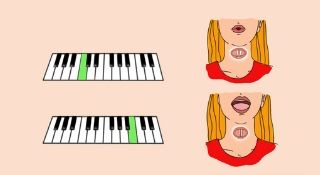How To Improve Your Singing Voice
One of the best ways to improve your singing voice is to remove the strain from it when you sing.
If you're singing with strain on your voice you will be limiting your vocal range and your tone quality.
You'll also feel much less freedom when you sing and find it harder to hit notes in key.
Watch this video to learn why you might be feeling strain, and how you can overcome this.
The Issue Of Strain
Often when singing you will find that you’re straining or pushing to get certain notes. This is usually the case with high notes.
The reason for this is simple. When we incorrectly sing we can cause certain muscles to start tensing. This can lead to moving our larynx (voice box). As a result we cut off the flow of air we use to sing.
To compensate we often tighten up and push more to reach the notes. All this compounds to create a form of singing that can really damage the voice. In this video I’m going to be discussing the causes and how to fix this problem.
The Secret To Star Singing
Click HERE For The Secret To Star Singing
The Secret To Star Singing
Click HERE For The Secret To Star Singing
What Causes This?
Usually the cause of this strain is created by certain muscles. Often it is the outside muscles of the neck. These muscles are connected to the larynx, so directly affect the sounds you make.
If you feel tension in your neck when singing this is why. If you do this you’ll tend to do it more when pushing for higher notes.
The problem this causes is it cuts off the air to your vocal chords. But why is this problem?
How We Use Air To Sing
Your body creates sound by air coming through the windpipe (trachea). This makes the vocal chords (found in the larynx) vibrate and create a noise.
However, muscle tension can move the larynx. This causes the flow of air to the vocal chords to stop. Often we can hear this through breathy sounds when we are trying to sing. I talk a great deal about this in many other videos on singing technique (to have a look at a few follow this link).
Ironically when we feel we don’t have enough air we will try to push and strain more. This can further reinforce the very habits that are cutting off our air in the first place.
Exercises To Correct This
In order the fix this I want to take you through a really simple exercise. This is going to help correct any bad habits of straining for notes you’ve picked up.
Remember, straining is only one issue and will not fix all your singing problems. We all have individual voices and as a result each voice will have its own strengths and weaknesses.
How To Do The Exercise
For this exercise all I want you to do is change how you approach notes you’re singing. I never want you to think you’re pushing for notes you’re trying to sing.
Instead imagine your letting go of your voice and allowing the vocal chords to naturally change to get to the note. I know this sounds a bit strange.
Really we need to actively make our voices relax when singing. It helps to keep the flow of air moving thorough our vocal chords. When done correctly this will allow us to reach more difficult notes and hold them for far longer periods of time.
Explanation Of This Exercise
Make sure you watch my example to really understand how to do this exercise correctly. I decided to do this exercise on an A but you can do it on whatever note you’d like.
Start slowly but then as you get used to the exercise start to move up the scale. Often when we start this can be tricky so take your time and let your voice warm up.
The trick of this exercise is to really picture yourself letting go as you move up the scale. This is important as it keeps the vital flow of air to our vocal chords.
If we don’t let go of our sound the vocal chords won’t change in the way they are supposed to. This will mean you won’t be able to hit the note you’re after when singing.
Developing Your Hearing
Often times when we are readjusting our singing techniques it takes time. This is because we are so used to using the wrong muscles and techniques to sing. As a result in the beginning we won’t even hear that we aren’t hitting the correct notes.
If this is you then I recommend really listening to the notes as you sing. Often when we focus on the sound we can hear if it is the correct note. I recommend focusing on a spot in our forehead. Sounds strange I know but give it a try.
Tips For Practicing Those High Notes
Something that people really struggle with is keeping the flow of air for the higher notes. Often this is where we strain and push the most. This can really cause damage and wear to our voices if done over a long period of time.
I suggest for dealing with this you “back off the sound”. This is similar to letting go of our sound. However, it also means that we don’t put a lot of force behind these high notes.
I’m sure this is the opposite of what many of you have been doing. It is very tempting to put a lot of energy behind notes that are above our normal singing range.
However, as I’m sure you’ve figured out by now, to allow our voices to sing properly they need to be relaxed. For these high notes I suggest to have patience and let your sound develop.
Start practicing with less air and power and gradually build up. Remember nothing improves the voice more than patience and practice.
Improving Your Voice Now
If you’d be interested in improving your singing then go and check out more of my videos here. There are videos to help with almost everything you might struggle with, from signing technique to learning how to become a world class performer.
About The Author
 Roger Burnley - Vocal Coach Roger Burnley - Vocal Coach |
Roger Burnley is a vocal coach located in Hollywood, California. He has been teaching singers for over 30 years and singing for even longer than that.
Notable past and present clients include Macy Gray, Brandy, Ray J, The Beastie Boys, James Torme, Taylor Lautner, Nona Gaye, and many more.
His clients have collectively sold more than 30 million albums, with several reaching Platinum and Gold status.
Roger has been featured on VH1, TV Guide Channel, TV One,
and MTV appearing as a vocal expert.
About The Author
 Roger Burnley - Vocal Coach Roger Burnley - Vocal Coach |
Roger Burnley is a vocal coach located in Hollywood, California. He has been teaching singers for over 30 years and singing for even longer than that.
Notable past and present clients include Macy Gray, Brandy, Ray J, The Beastie Boys, James Torme, Taylor Lautner, Nona Gaye, and many more.
His clients have collectively sold more than 30 million albums, with several reaching Platinum and Gold status.
Roger has been featured on VH1, TV Guide Channel, TV One,
and MTV appearing as a vocal expert.









New! Comments
Show me you're alive! Leave a comment below...